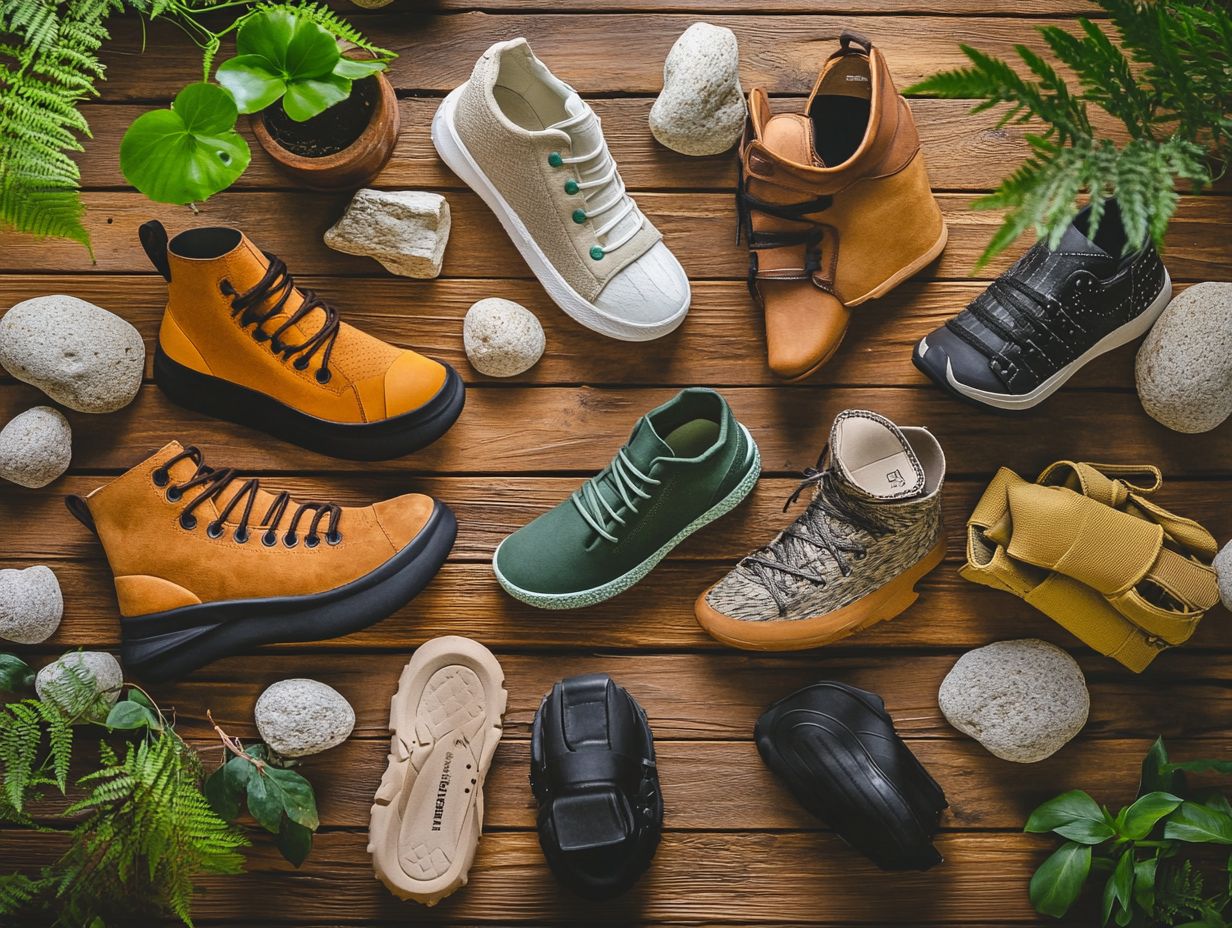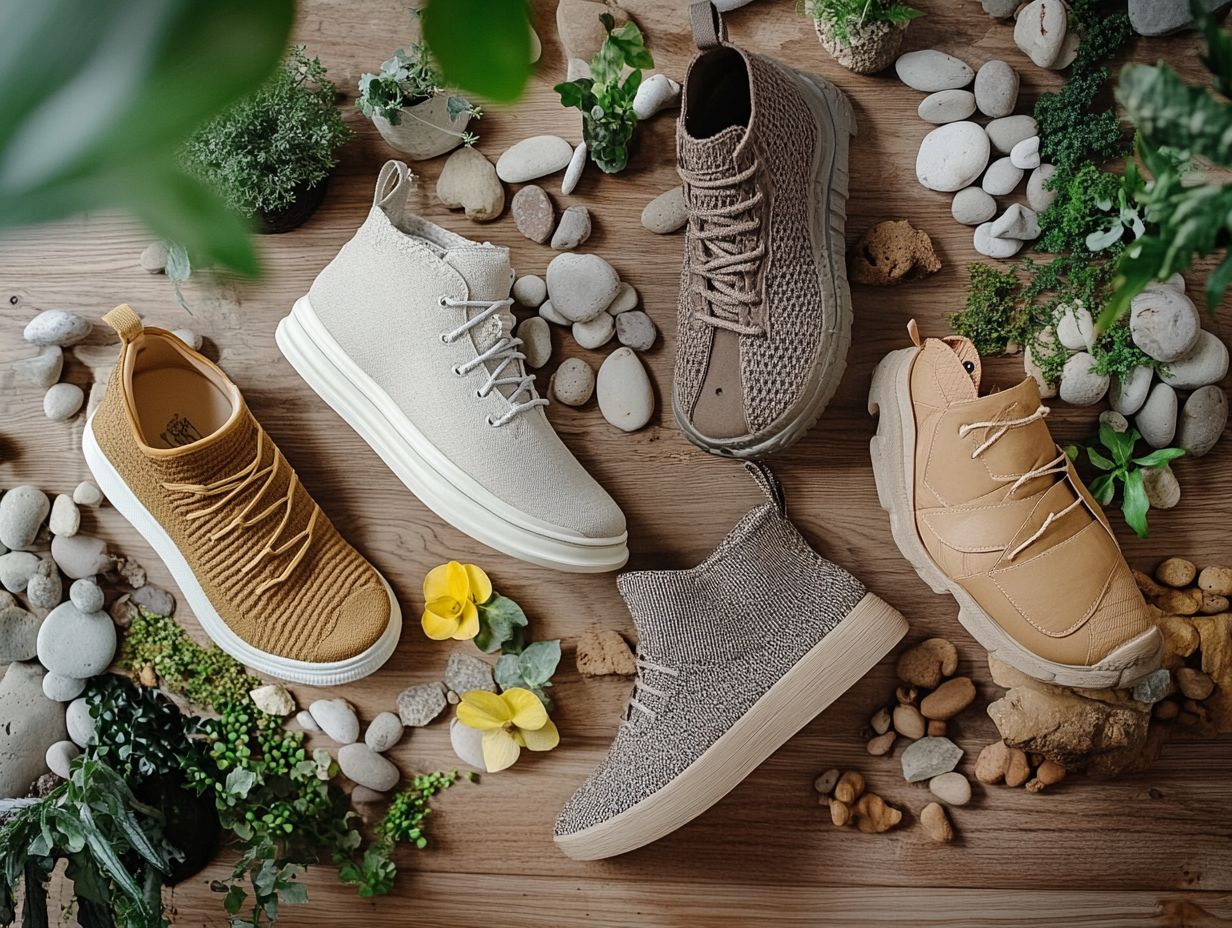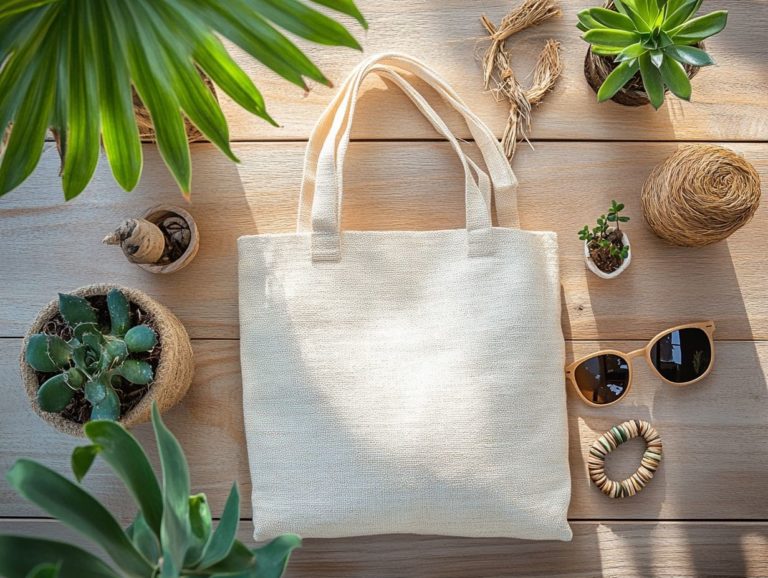Choosing Sustainable Footwear: Key Considerations
Sustainable footwear is crucial. The fashion industry has a significant impact on the environment, contributing to large carbon footprints and raising ethical concerns about labor practices.
As eco-conscious shoppers increasingly seek transparency and ethical manufacturing, sustainable shoes offer a compelling solution to mitigate the adverse effects of traditional footwear production. By opting for eco-friendly choices, you can shape the sustainable footwear market and encourage brands to embrace responsible sourcing and innovative technologies that prioritize quality and ethical standards.
Contents
- Materials Used in Sustainable Footwear
- Key Takeaways:
- Factors to Consider When Choosing Sustainable Footwear
- Sustainable Footwear for Different Activities
- Casual and Everyday Shoes
- Specialty Footwear (Hiking, Water, etc.)
- Tips for Maintaining and Extending the Life of Sustainable Footwear
- Frequently Asked Questions
- What are the key considerations when choosing sustainable footwear?
- How can I determine if a shoe is made from sustainable materials?
- What production processes should I look for in sustainable footwear?
- Are there any certifications or labels that indicate a shoe is sustainable?
- What is the overall impact of unsustainable footwear on the environment and society?
- Can sustainable footwear be stylish and fashionable?
Environmental and Social Impact
The environmental and social impact of sustainable shoes goes far beyond their eco-friendly materials. It shapes ethical manufacturing processes and promotes fair labor practices throughout the entire supply chain.
When you choose sustainable options, you re not just making a fashion statement; you re actively supporting reduced water consumption during production. Many brands embrace innovative techniques that use significantly less water than traditional manufacturing.
You’ll notice the emphasis on waste reduction as well. Sustainable footwear brands often implement recycling programs for old shoes and creatively use upcycled materials in their designs.
On the social front, supporting these brands means endorsing fair wages and improved working conditions for laborers. This helps cultivate a more equitable fashion industry that values human rights alongside environmental stewardship.
When you opt for sustainable choices, you re joining a powerful movement that champions ecological balance and social justice.
Materials Used in Sustainable Footwear
The materials you choose in sustainable footwear are pivotal in diminishing the environmental footprint of the shoe industry. Many brands committed to sustainability select eco-friendly options like organic cotton and natural rubber.
They also embrace innovative alternatives such as Pi atex and Tencel. These materials not only uphold sustainability but also ensure quality and comfort remain uncompromised.
Eco-Friendly and Ethical Choices
Choosing eco-friendly and ethical footwear requires delving into the environmentally friendly practices of various brands. Look for their commitment to responsible sourcing and recycling initiatives.
By doing this, you make purchases that reflect your values while supporting a movement toward environmental stewardship. Companies that embrace innovative materials like organic cotton, recycled plastics, or vegan leather can significantly reduce the carbon footprint associated with traditional footwear production.
Brands like Allbirds and Veja stand out as leaders in this arena. They pledge transparency in their supply chains and adhere to fair labor practices. By choosing their products, you align yourself with ethical standards and eco-friendly methodologies.
Ultimately, your informed choices in footwear elevate your personal style and contribute to a more sustainable future.
Key Takeaways:

- Choose sustainable footwear to reduce environmental and social impact.
- Look for eco-friendly and ethically sourced materials when purchasing.
- Consider comfort, durability, transparency, and certifications.
Dive into this exciting journey today and start making sustainable choices!
Factors to Consider When Choosing Sustainable Footwear

Look out for these key factors when choosing your sustainable footwear! Consider the comfort, durability, and quality of the shoes, along with the brand’s transparency about their manufacturing processes and ethical labor practices.
Each of these elements plays a crucial role in ensuring that your choice is not only environmentally friendly but also aligns with your values.
Comfort and Durability
When you re selecting sustainable footwear, comfort and durability should be at the top of your list. High-quality construction using sustainable materials ensures that your shoes can withstand daily wear.
This delivers the comfort you, as someone who cares about the environment, truly seek.
This combination boosts the longevity of your footwear and plays a significant role in minimizing environmental impact. You re increasingly aware that shoes made from responsibly sourced materials, like organic cotton or recycled plastics, feel fantastic and contribute to a healthier planet.
The craftsmanship behind such footwear often highlights meticulous attention to detail, ensuring that each pair fits well and supports your foot health. So, when you invest in these durable yet comfortable options, you not only enjoy practical usage but also gain peace of mind, knowing your choices reflect your sustainable values.
Brand Transparency and Certifications
Brand transparency and certifications are vital signals of your commitment to ethical practices in sustainable footwear. Certifications like B Corp, Fair Trade, and the Global Organic Textile Standard reassure eco-conscious shoppers that they re making responsible choices.
In today’s world, where consumers are increasingly discerning about their purchases, these indicators not only build trust but also enable you to make informed decisions. When companies actively highlight their sustainable practices and maintain transparency regarding their sourcing and manufacturing processes, they often cultivate strong relationships with their customers.
By being open about their supply chain and the ethical standards they uphold, businesses in the sustainable footwear sector can set themselves apart in a crowded market. This approach ultimately attracts a loyal customer base that values authenticity and responsibility, making your commitment to sustainability not just a strategy, but a meaningful connection with your audience.
Sustainable Footwear for Different Activities
Sustainable footwear isn’t a one-size-fits-all solution; different activities demand specific footwear choices. You must ensure that eco-friendly options deliver the comfort and durability you need for your unique pursuits.
Running and Athletic Shoes
For your running and athletic endeavors, consider sustainable shoes crafted from eco-friendly materials that prioritize both comfort and performance. This allows you to pursue your goals without compromising your environmental values.
This approach not only champions a healthier planet but also meets the growing demand for high-quality footwear. Leading brands like Allbirds and Saucony are at the forefront, utilizing recycled plastics and organic cotton to create shoes that are both lightweight and durable.
Technologies such as Adidas’ Parley line, which incorporates ocean plastic, showcase how you can marry high performance with environmental responsibility. By choosing these innovative options, you can feel confident about your impact on the planet while enjoying enhanced support and comfort during your workouts.
Casual and Everyday Shoes

Casual and everyday shoes are a significant part of the sustainable footwear market. They offer stylish and comfortable options that align with the latest fashion trends while being eco-conscious.
This expanding category features various innovative designs crafted from recycled materials, organic fabrics, and vegan leathers. You can showcase your personal style without sacrificing your values. Brands that focus on the environment are now incorporating fabrics that let air in and ergonomic designs that enhance foot comfort. These shoes are perfect for all-day wear.
These sustainable choices demonstrate a dedication to the environment and blend seamlessly with current fashion trends emphasizing both aesthetic appeal and conscious consumerism. By opting for these alternatives, you can merge fashion with sustainability, setting a standard for responsible style.
Specialty Footwear (Hiking, Water, etc.)
When it comes to specialty footwear like hiking and water shoes prioritize performance and durability. Embrace sustainable materials to meet the demands of your outdoor adventures, especially if you care about the environment.
Select eco-friendly fabrics such as recycled polyester and organic cotton. These materials not only reduce environmental impact but also offer better breathability and comfort for those long excursions. Unique construction methods like seamless designs prevent blisters and chafing, allowing you to focus on your outdoor pursuits without discomfort.
Natural rubber soles provide excellent traction across varied terrains, crucial whether you’re trekking rugged trails or navigating slippery riverbanks. With tech that keeps your feet dry integrated into the design, your sustainable specialty footwear becomes a high-performing partner for every adventure.
Tips for Maintaining and Extending the Life of Sustainable Footwear
To extend the life of your sustainable footwear, take the right steps for care and repair. These methods enhance durability and promote eco-friendly practices, ensuring your investment in sustainable fashion pays off for years.
Proper Care and Repair Techniques
Proper care and repair techniques are vital for the longevity of your sustainable footwear. Incorporating simple routines can significantly extend the life of your eco-friendly shoes and promote waste reduction.
Techniques like regularly cleaning with natural products, using specialized sprays to protect materials, and storing them appropriately can greatly enhance the integrity of your shoes.
Learning basic repair skills, such as re-gluing loose soles or swapping out worn laces, saves you money and reinforces your commitment to sustainable practices and ethical labor conditions. Embracing these methods promotes a conscious approach to consumption, contributing to both environmental preservation and personal accountability.
Frequently Asked Questions
What are the key considerations when choosing sustainable footwear?

Some important factors to consider include the materials used, the manufacturing processes, the company’s values and practices including transparency and the overall impact on the environment and society.
How can I determine if a shoe is made from sustainable materials?
Look for shoes made from natural, renewable materials like organic cotton, hemp, or bamboo. Avoid materials such as vegan leathers or synthetic materials made from petroleum.
Explore more sustainable footwear options and make a difference with your choices!
What production processes should I look for in sustainable footwear?
Look for shoes made using fair and green production methods. These can include solar or wind energy, fair wages, and reduced chemical use.
Are there any certifications or labels that indicate a shoe is sustainable?
Yes, look for labels like Fair Trade, B Corp, and the Global Organic Textile Standard (GOTS). These show that the company meets specific ethical and sustainability standards.
What is the overall impact of unsustainable footwear on the environment and society?
Unsustainable footwear contributes to deforestation, pollution, and worker exploitation in the supply chain.
These issues reflect a lack of responsible sourcing and increase waste and the carbon footprint of the fashion industry.
Can sustainable footwear be stylish and fashionable?
You can find many stylish and sustainable footwear options! Brands like Allbirds, Veja, and Rothy s prioritize eco-friendly materials while creating eye-catching designs.






